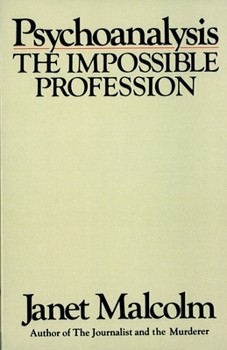Psychoanalysis: The Impossible Profession (Master Work)
Select Format
Select Condition 
Book Overview
From the author of In the Freud Archives and The Journalist and the Murderer comes an intensive look at the practice of psychoanalysis through interviews with "Aaron Green," a Freudian analyst in New York City. "Janet Malcom has managed somehow to peer into the reticent, reclusive world of psychoanalysis and to report to us, with remarkable fidelity, what she has seen. Her book is journalism become art." --Joseph Andelson, The New York Times Book Review Malcolm is accessible and lucid in describing the history of psychoanalysis and its development in the United States. It provides rare insight into the contradictory world of psychoanalytic training and treatment and a foundation for our understanding of psychiatry and mental health.
Format:Paperback
Language:English
ISBN:0394710347
ISBN13:9780394710341
Release Date:September 1982
Publisher:Vintage
Length:192 Pages
Weight:0.50 lbs.
Dimensions:0.6" x 5.2" x 8.0"
Customer Reviews
2 ratings
Out of date?
Published by Thriftbooks.com User , 24 years ago
Readers should not look here for important recent developments, for this book was written in 1982. It was written at the end of the popularity of psychoanalysis.By 1982, starting in the 1960s, various new forms of therapy emerged in competition with psychiatry and although Malcolm gives these a nod for her classic Freudian analysis was the King, the Father, and the center.This father is now as spectral as Hamlet's Dad, and even New Age therapies are beginning to fall into disrepute. The sort of personality able to play the role of analyst who himself does not buy in to whatever malarkey the patient is laying down is in decline these days, for more and more people including medical doctors do not have anything like Freud's 19th century confidence in the validity of an *haute* bourgeois biography. Starting in the 1960s, analysts were not so confident that boys wanted to grow up to be what we now would think are stuffed shirts, and of course the story failed to fit women's aspirations.However, as Robert Bly as pointed out, no new narrative replaced the old narrative with the result that psychiatrists can be as threatened or in general as dysfunctional as their patients.Another problem lies in the fact that in 1982 and today, Americans pay their doctors (including their head shrink) using Someone Else's Money.The best way to save for being physically sick in a laissez faire society is to have a 401K, and also to live a healthy lifestyle, including exercise, alcohol in moderation and tobacco not at all. This way you have at least a chance of paying the bill even if uninsured, perhaps by making time payments and getting the caregivers to give you a break. Or, you can use (disappearing) public institutions.However, note that with regards to mental illness, the "system" that is preparing for the future by saving and leading a healthy lifestyle is by definition dysfunctional, and mental illness builds up over time. Except for narrowly defined disorders, mental illness is a slow train coming and its onset often includes behaviors at odds with the norm recommended by laissez-faire. There are exceptions, but for every head case who compulsively oversaves, taking the laissez-faire ideal to extremes, there are tens of nutbars who waste their money and engage in substance abuse.This means that almost by definition societal provision has to be made for the mentally ill but almost by definition a laissez-faire society is unwilling to do so. And to the extent that HMO and insurance companies internally resemble Socialist societies (in that they have the open-ended duty to care for the people who've paid premiums, as socialist states precommitt themselves to cradle-to-grave care for citizens) they are reluctant to pay for extended mental care.However, as Malcolm points out, classic analysis is open-ended and difficult to terminate. It seems to contemporary culture to be an iatrogenic time-waster, that causes wimped-out Woody Allen clones to acquire problem
A great introduction into the world of psychoanalysts
Published by Thriftbooks.com User , 26 years ago
Janet Malcolm's book is a great read; very accessible and lucid. The book is couched (sorry for the pun) as an interview with an analyst in New York City who discusses some of the more controversial issues about analysis. In particular, the author explores whether or not analysts should become more "loving and caring" with their patients. Mixed in with the interview are great passages from Freud and other analysts on these topics. If you're like me, you'll bristle at the unbelievable arrogance of some of the anyalysts she speaks with.






